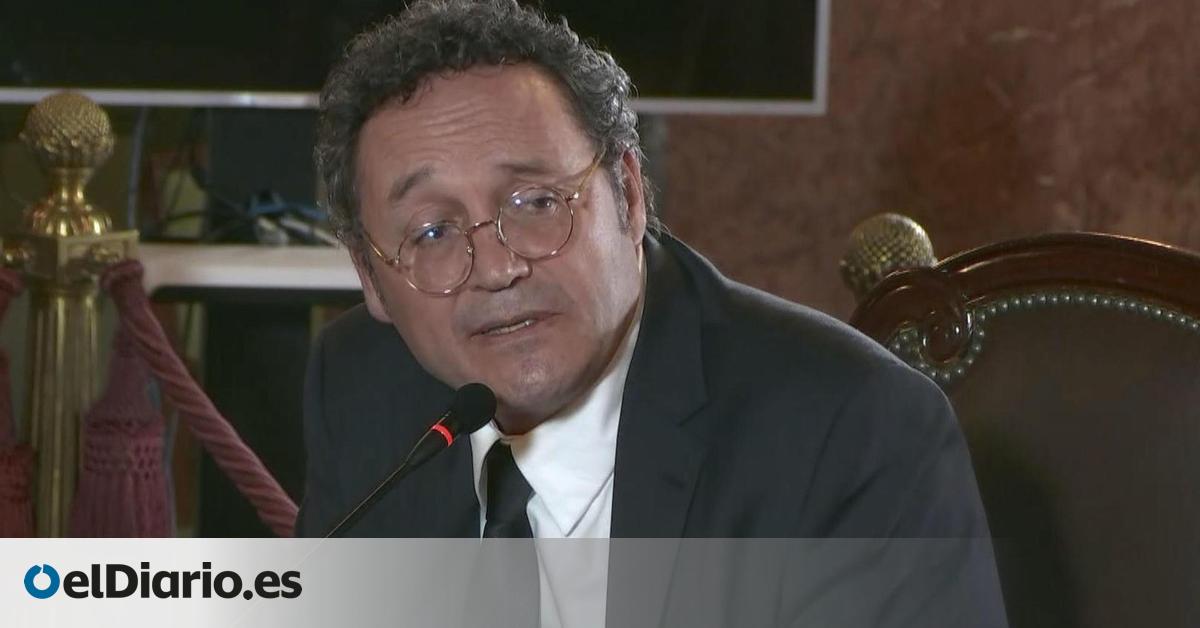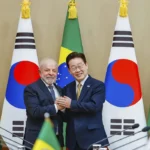
“The truth is not filtered, the truth is defended.” The State Attorney General closed his statement before the court trying him for the alleged leak of a confidential email from businessman Alberto González Amador, partner of Isabel Díaz Ayuso, with this phrase. During the previous hour and a half, Álvaro García Ortiz defended his innocence, denied having leaked any confidential information and stated that his only objective was to defend his subordinates and the institution against the “insidiousness” and “slander” from those around the president of the Community of Madrid. He did so in response to questions from his lawyer, as he refused to respond to the accusations that ask him for up to six years in prison. And he did so after a lieutenant colonel of the Civil Guard, Antonio Balas, pointed him out directly for his alleged “dominance” over the leak in a performance highly questioned by his defense.
The State Attorney General spoke after the most complicated morning for him of the five sessions held so far in the hearing being held in the Supreme Court. He was seen looking to the sides, making signs and talking to his lawyer, State Attorney Consuelo Castro, while Lieutenant Colonel Balas and his colleagues from the Central Operational Unit (UCO) of the Civil Guard openly accused him of having leaked the mail. Everything, in the run-up to the last day of the trial, when the parties will present their conclusions after having heard 28 witnesses and the agents who participated in the reports that support the case that was opened a year ago and that is coming to an end.
This Thursday, the prosecution will insist that the attorney general must be convicted for leaking or ordering the leaking of that email. His defense will demand his acquittal and is expected to allege the absence of evidence and focus on the excesses of Judge Ángel Hurtado, who led the investigation that ended up bringing an active attorney general to the bench for the first time in democracy. Already in the processing of preliminary issues—before the interrogations began—the State lawyers handling his defense charged against the instructor, whom they accused of having promoted an “inquisitorial” process and of having acted with the “preconceived idea” that his client was guilty.
Hurtado’s investigation has pivoted precisely on the reports of the UCO agents who searched the attorney general’s office and who attributed him a “preeminent” role in the leak of González Amador’s confession. In that email, the businessman admitted the crimes against the Public Treasury and document falsification for which he is already being prosecuted. Before the court, the agents have confirmed the conclusions drawn by those reports. And they have maintained that the attorney general had “absolute control” of all the information related to González Amador and that said information—the tax file, the complaint and the confession email—was only leaked after going through the State Attorney General’s Office.
According to Lieutenant Colonel Balas, these elements would constitute definitive proof of an almost systematic “modus operandi” in which information was collected from the State Attorney General’s Office to, presumably, leak it later. The agents’ considerations were met with reproaches from both the Prosecutor’s Office and the State Attorney’s Office, who accused the civil guards of the elite unit of the Civil Guard of omitting relevant facts in their reports.
State attorney Consuelo Castro focused on calling into question the “creative interpretations” and “inferences” of the agents to put together a story that would make her client appear guilty. Thus, he highlighted the omissions detected in these reports. He focused, for example, on why suspicions focused from the beginning on García Ortiz despite the fact that more than 400 people had access to the complaint against the businessman. That complaint, Castro explained, was uploaded to a shared folder of the Madrid Prosecutor’s Office “to which 499 people, including prosecutors and officials, had access.” Also to a third folder to which “around 30 people” have access.
“We do not do prospective investigations,” the lieutenant colonel justified then, recalling that at first the investigation focused on a “cast of people,” although later they settled “on a specific one.” The words of the UCO commander caused laughter from some of those present in the room. This Wednesday’s session had a large attendance of García Ortiz’s collaborators and colleagues. Minutes later, the judge warned the public that they could not “approve or disapprove” the considerations of those questioned.
Final session: acquittal or six years in prison
García Ortiz repeated this Wednesday in the Supreme Court the same strategy that he deployed in the investigation phase before Judge Hurtado: he only answered the Prosecutor’s Office and the State Attorney’s Office although he made it clear that he would also answer questions from the Court if required. The attorney general dedicated his first intervention to explaining why he refused to answer the accusations: due to the “disloyal actions” of Ayuso’s partner, who, among other things, hid from the courts for a year that he had sent his confession and several emails about the case to more people than he acknowledged in his complaint. And also because of the “sword of Damocles,” added the State Attorney, which means defending oneself under the yoke of UCO records that he considers null and void from the first day of the investigation.
The end of Wednesday’s session connects with what will be the final day of the trial this Thursday: the reports and final arguments of the parties. The accusations, with some small modifications in their writings, announced at the last minute that they were making their prison requests definitive: the highest of six years and the rest of four years of imprisonment with fines and compensation that, in the most serious cases, reach 300,000 euros.
This Thursday they will rely on the testimonies of the UCO and the senior prosecutor Almudena Lastra to support their accusation while the Prosecutor’s Office and the State Attorney insist that García Ortiz must be acquitted: due to lack of evidence, because that confession was no longer secret when it came into the hands of the attorney general and, finally, because they consider that Judge Hurtado carried out his investigation with the Civil Guard based on deductions that always pointed to the attorney general and never considered another possibility.
State Attorney Consuelo Castro already advanced on the first day what one of her means of attack was going to be: targeting the “inquisitive” attitude of Judge Hurtado during eight months of investigation. “It has been an unfair process,” he said in his first intervention. This Wednesday, Castro, his partner Juan Ignacio Ocio and the lieutenant prosecutor María Ángeles Sánchez Conde asked the UCO agents in ten different ways if they carried out trawling in the October 2024 records, if they adhered to what the Supreme Court had requested and if Hurtado’s orders did not discriminate between what was necessary and what was expendable.
The president of the court himself, Andrés Martínez Arrieta, intervened to ask about the technical particularities of an information dump in a registry. And the State Attorney reproached Lieutenant Colonel Balas for his key reports only working with one possible hypothesis: that the culprit was García Ortiz. “I don’t know,” he managed to get out of the UCO agents by asking if, at any point, they took into account that the email from lawyer Carlos Neira had arrived in a generic mailbox at the Madrid Prosecutor’s Office to which 16 different people had access.
Both the Lawyers and the Prosecutor’s Office are convinced that there is no direct evidence to prove that García Ortiz leaked the document or gave orders to do so. “What I want is for the Prosecutor’s Office’s response to the citizens to be public and truthful,” the accused explained this Wednesday to explain that he had no interest in the email ending up in the media: his “obsession” was “protecting the prosecutors.”
The verdict for sentencing will come this Thursday after six trial sessions in which 40 people have spoken for hours about a leak with no known author. Several journalists have explained that the information contained in that email and the document itself was not secret when it came into the hands of García Ortiz, several prosecutors have added that it was available to many people for weeks before that day and several UCO agents have deduced that the leaker could only have been him. Some have even openly denied that the attorney general was their source while the shadow of the deletion of their cell phone hangs over their claims of innocence.
Source: www.eldiario.es

